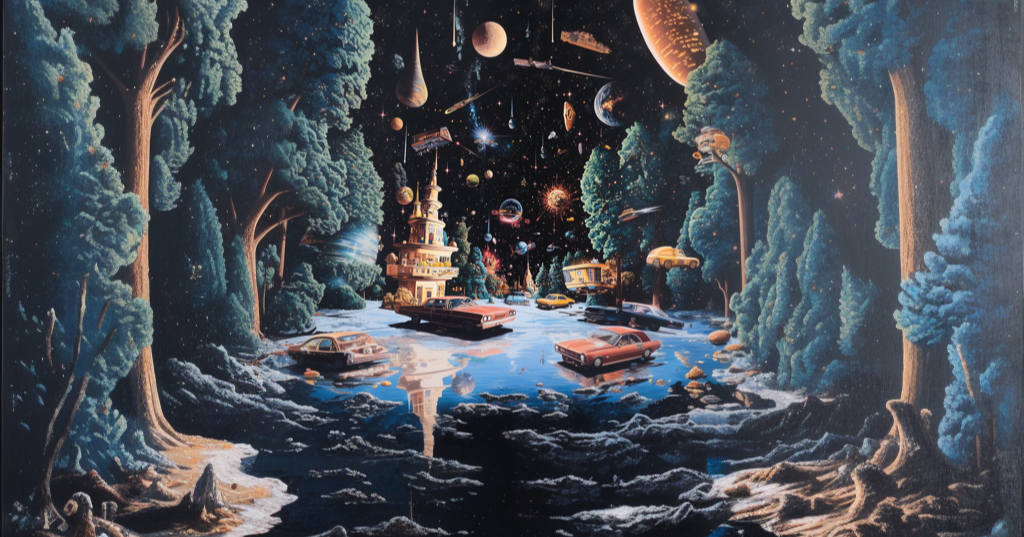Introduction
The world is brimming with astonishing truths and random facts that will surprise you. From the mysteries of space to the peculiarities of human history, there are countless random facts that will surprise you and leave you eager to learn more. In this blog post, we’ll explore ten captivating facts that will not only pique your curiosity but also expand your understanding of the world in unexpected ways. Get ready to be amazed as we dive into these surprising tidbits of knowledge!
Table of Contents
The Marvels of the Human Body
The human body is a marvel of nature, full of complex systems and astonishing capabilities. In this chapter, we’ll explore random facts that will surprise you about how our bodies work and the incredible things they can do.

Your Stomach Has a Second Brain
Did you know that your stomach has its own nervous system, sometimes called the “second brain”? This network of neurons in your gut communicates with your main brain, playing a key role in your mood, digestion, and even your immune system. This fascinating connection between your gut and brain is known as the gut-brain axis.
Bones Are Stronger Than Steel
It might surprise you to learn that, pound for pound, human bones are stronger than steel. Our bones can withstand immense pressure and stress, making them incredibly durable. This strength is due to their unique structure, which allows them to absorb and distribute force efficiently.
The Human Eye Can Distinguish Millions of Colors
The human eye is capable of detecting more than 10 million different colors. This remarkable ability is thanks to the cone cells in our retinas, which are sensitive to various wavelengths of light. Despite this, our eyes are still limited compared to some animals, like mantis shrimp, which have even more photoreceptors.
Incredible Animal Abilities You Never Knew About
Animals possess extraordinary abilities that often go unnoticed. This chapter uncovers random facts that will surprise you about the animal kingdom’s hidden talents.

Octopuses Can Edit Their RNA
Octopuses are not only intelligent but also capable of altering their genetic material in response to environmental changes. Unlike most creatures, which rely on DNA mutations, octopuses can edit their RNA, allowing them to rapidly adapt to their surroundings. This ability helps them survive in a wide range of environments, from deep ocean floors to coral reefs.
Crows Remember Human Faces
Crows are among the most intelligent birds on the planet, and they have an exceptional memory for human faces. Studies have shown that crows can remember people who have threatened them or treated them kindly, and they can pass this information on to other crows. This remarkable ability is a testament to their social intelligence and adaptability.
Sloths Only Poop Once a Week
Sloths are known for their slow movements, but did you know they also have a unique digestive system? These animals only defecate once a week, making them some of the slowest digesters in the animal kingdom. This behavior is a survival strategy, as descending to the ground to poop makes them vulnerable to predators.
Surprising Facts About Outer Space
Outer space is a vast and mysterious frontier, full of wonders that can leave us awestruck. In this chapter, we’ll explore random facts that will surprise you about the cosmos and our place in it.

The Sun Makes Up 99.86% of the Solar System’s Mass
The Sun is by far the largest object in our solar system, accounting for 99.86% of its total mass. This massive star exerts a gravitational pull that keeps all the planets, moons, and other celestial bodies in orbit around it. Without the Sun’s immense mass and gravity, our solar system as we know it would not exist.
There Are More Stars in the Universe Than Grains of Sand on Earth
It’s mind-boggling to think about the scale of the universe, but astronomers estimate that there are more stars in the cosmos than grains of sand on all the beaches of Earth. With an estimated 100 billion galaxies, each containing millions or even billions of stars, the universe is unimaginably vast.
A Day on Venus Is Longer Than Its Year
Venus has one of the most unusual rotations in our solar system. It takes 243 Earth days to complete one rotation on its axis, making a day on Venus longer than its year, which is only 225 Earth days long. This slow rotation, combined with its thick atmosphere, creates some of the most extreme weather conditions in the solar system.
Hidden Stories from History
History is full of surprising events and little-known facts that often go untold. This chapter reveals random facts that will surprise you about historical moments that shaped our world.

Cleopatra Lived Closer in Time to the Moon Landing Than to the Pyramids
One of the most surprising historical facts is that Cleopatra, the last active ruler of the Ptolemaic Kingdom of Egypt, lived closer in time to the Moon landing in 1969 than to the construction of the Great Pyramid of Giza. The pyramids were built around 2560 BCE, while Cleopatra reigned from 51-30 BCE, over 2,000 years later.
The Eiffel Tower Can Grow Taller
The Eiffel Tower, one of the most iconic landmarks in the world, can grow by up to 6 inches during the summer. This is due to the thermal expansion of its iron structure when it’s exposed to heat. As the temperature rises, the metal expands, causing the tower to increase in height slightly.
The Shortest War in History Lasted 38 Minutes
The Anglo-Zanzibar War, fought between the United Kingdom and the Sultanate of Zanzibar on August 27, 1896, is the shortest war in recorded history. It lasted only 38 minutes, ending in a decisive British victory and the installation of a pro-British Sultan.
Unexpected Wonders of the Natural World
Nature is full of wonders that often go unnoticed. In this chapter, we’ll explore random facts that will surprise you about the hidden beauty and strangeness of the natural world.

There Are Plants That “Eat” Metal
Certain plants, known as hyperaccumulators, have the ability to absorb and store unusually high levels of metals from the soil. These plants, such as the alpine pennycress and some ferns, can accumulate metals like nickel, zinc, and even gold in their tissues without being harmed. Scientists are studying these plants for potential use in phytoremediation, a process of cleaning polluted soils.
A Waterfall That Flows Upward
In Denmark, there is a waterfall known as the “Reversed Waterfall” where the water appears to flow upward. This phenomenon is caused by strong winds blowing against the waterfall, pushing the water upward instead of allowing it to fall downward. It’s a stunning example of how natural forces can create surprising and beautiful effects.
The Largest Organism on Earth Is a Fungus
The largest living organism on Earth is not a whale or a tree, but a fungus. Known as the “Humongous Fungus,” this organism is a type of honey fungus (Armillaria ostoyae) that covers an area of over 3.5 square miles in Oregon’s Malheur National Forest. It’s estimated to be around 2,400 years old and weighs hundreds of tons.
The Most Unusual Laws Around the Globe
Laws are meant to maintain order, but some are so unusual that they defy explanation. This chapter delves into random facts that will surprise you about strange laws from different countries.

It’s Illegal to Own Just One Guinea Pig in Switzerland
In Switzerland, it’s illegal to own just one guinea pig. This law was enacted because guinea pigs are social animals that can suffer from loneliness if kept alone. To ensure their well-being, owners must have at least two guinea pigs so they can keep each other company.
No Chewing Gum Allowed in Singapore
Singapore is known for its strict laws, but one of the most unusual is the ban on chewing gum. Introduced in 1992, the law prohibits the sale and import of chewing gum to maintain the cleanliness of public spaces. Exceptions are made for therapeutic, dental, and nicotine gums, but they must be prescribed by a doctor.
In Milan, It’s Mandatory to Smile
In Milan, Italy, there’s a law that requires citizens to smile at all times, except during funerals or hospital visits. This quirky regulation dates back to the 19th century and was intended to promote positivity and well-being among the population. While it’s not strictly enforced today, it remains one of the more unusual laws in Europe.
Quirky Inventions with Fascinating Origins
Some inventions have changed the world, while others are simply strange and unexpected. This chapter uncovers random facts that will surprise you about quirky inventions and their origins.

The Slinky Was Originally an Engineering Tool
The Slinky, a popular toy known for its ability to “walk” down stairs, was originally invented as an engineering tool. In 1943, naval engineer Richard James was working on a project to stabilize sensitive instruments aboard ships when he accidentally knocked a spring off a shelf. Seeing how it “walked” across the floor, he realized its potential as a toy, and the Slinky was born.
Bubble Wrap Was Meant to Be Wallpaper
Bubble wrap, now commonly used as packaging material, was originally invented as textured wallpaper. In 1957, engineers Alfred Fielding and Marc Chavannes created the material by sealing two shower curtains together, trapping air bubbles inside. When the wallpaper idea didn’t take off, they repurposed bubble wrap for packaging, and it became a global phenomenon.
The Frisbee Started as a Pie Tin
The Frisbee, a popular flying disc used in sports and recreation, has its origins in a pie company. In the 1940s, students at Yale University began tossing around empty pie tins from the Frisbie Pie Company for fun. This activity eventually evolved into the creation of the plastic Frisbee, which has become a staple of outdoor games.
Strange and Surprising Cultural Traditions
Cultural traditions often reflect the values and beliefs of a society, but some are so unique that they defy explanation. This chapter explores random facts that will surprise you about unusual cultural practices from around the world.

La Tomatina: The World’s Largest Food Fight
Every year in the town of Buñol, Spain, thousands of people gather for La Tomatina, the world’s largest food fight. Participants throw overripe tomatoes at each other in a massive street battle that lasts for about an hour. The tradition began in 1945 and has since become a major tourist attraction.
Japan’s Naki Sumo Baby Crying Contest
In Japan, there’s a centuries-old tradition known as the Naki Sumo, or “crying baby sumo” contest. During this event, sumo wrestlers hold babies and try to make them cry. It’s believed that the louder the baby cries, the more blessings they will receive from the gods. This unusual practice is thought to ward off evil spirits and ensure the child’s health.
The Cooper’s Hill Cheese-Rolling Festival
In England, the Cooper’s Hill Cheese-Rolling Festival is an annual event where participants chase a wheel of cheese down a steep hill. The event, which dates back to the 15th century, is both thrilling and dangerous, with many competitors suffering injuries as they tumble down the hill in pursuit of the cheese. Despite the risks, the festival remains a beloved tradition in the region.
Astonishing Human Achievements
Humanity has accomplished incredible feats throughout history, some of which are truly surprising. This chapter highlights random facts that will surprise you about astonishing human achievements.

The Great Wall of China Is Not Visible from Space
Contrary to popular belief, the Great Wall of China is not visible from space with the naked eye. While it’s an impressive feat of engineering, the wall is too narrow and blends too well with the natural landscape to be seen from orbit. This myth was debunked by astronauts who have been to space and confirmed that other man-made structures, such as cities and airports, are more easily visible.
The Longest Recorded Flight of a Chicken Is 13 Seconds
While chickens are not known for their flying abilities, one chicken managed to defy expectations with a record-breaking flight of 13 seconds. This surprising fact showcases the potential of these otherwise flightless birds to achieve short bursts of flight under the right conditions.
The Tallest Mountain on Earth Is Not Mount Everest
Mount Everest is often referred to as the tallest mountain on Earth, but if measured from base to peak, Mauna Kea in Hawaii is actually taller. While Mount Everest stands at 8,848 meters above sea level, Mauna Kea measures over 10,000 meters from its base on the ocean floor to its summit, making it the tallest mountain in the world when measured this way.
Everyday Objects with Hidden Secrets
Many everyday objects have hidden secrets or unexpected uses that we might not be aware of. In this chapter, we’ll uncover random facts that will surprise you about common items and their surprising properties.

The Tiny Hole in Airplane Windows Is There for Safety
If you’ve ever looked closely at an airplane window, you might have noticed a small hole near the bottom. This hole, known as a “bleed hole,” is there for safety reasons. It helps regulate the pressure between the cabin and the outside, preventing the window from shattering due to the difference in pressure at high altitudes.
The Numbers on Toaster Dials Represent Time, Not Heat
Many people believe that the numbers on toaster dials indicate the level of heat, but they actually represent the number of minutes the toaster will operate. This surprising fact can help you achieve the perfect level of toastiness by setting the timer to your preferred duration.
The Color of Your Bread Tag Indicates Freshness
The little plastic tags on bread bags come in different colors, and these colors actually indicate the day the bread was baked. Most bakeries use a color-coded system to help employees quickly identify the freshness of the bread, with each day of the week corresponding to a specific color. For example, blue might be used for bread baked on Monday, while green might indicate bread baked on Tuesday.
Conclusion
The world is full of random facts that will surprise you, offering endless opportunities to learn something new and unexpected every day. From the mysteries of the human body to the quirks of cultural traditions, these ten chapters have revealed just a glimpse of the fascinating and surprising truths that our world holds. Whether you’re sharing these facts with friends or simply enjoying the thrill of discovery, remember that there’s always more to explore and uncover. Stay curious, and keep seeking out the surprises that make life so wonderfully intriguing.
For more blog posts click here.
Images in this blog post were made using Midjourney.





